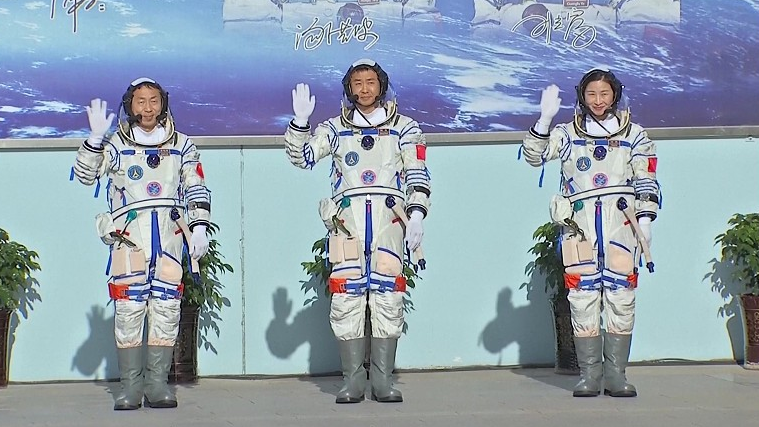
The Shenzhou-14 crew waves to the public before taking off at the Jiuquan Satellite Launch Center in northwest China, June 5, 2022. /CFP
The Shenzhou-14 crew waves to the public before taking off at the Jiuquan Satellite Launch Center in northwest China, June 5, 2022. /CFP
Three Chinese astronauts from the Shenzhou-14 crewed mission were awarded medals for their service to China's space endeavors on Friday.
Chen Dong, the mission commander, and Liu Yang, China's first female astronaut, were honored with second-class aerospace achievement medals. Chen is the first taikonaut to spend more than 200 days in orbit with two space missions. Cai Xuzhe received a third-class medal and the honorary title "heroic astronaut."
The awards were given by the Communist Party of China Central Committee, the State Council and the Central Military Commission.
The Shenzhou-14 crew was stationed at the space station for six months, returning last December, and has been dubbed the "busiest crew" of China's manned space program. They performed three extravehicular activities (EVAs), completed a plethora of equipment installation and tests, as well as a series of space experiments.
The Shenzhou 14 mission was the most complex manned mission since the construction of the space station.
The mission achieved a number of historic "firsts" in China's space exploration. During the mission, China for the first time had two manned spacecraft in orbit when both Shenzhou-13 and Shenzhou-14 were connected to the space station. Tianzhou-5 cargo spacecraft docked with the space station in a record time of only two hours during the Shenzhou-14 mission. It was also the first mission where taikonauts completed three EVAs during the stay.
(Cover: L-R: The crew members of China's Shenzhou-14 mission Liu Yang, Chen Dong and Cai Xuzhe. /China Manned Space Agency)